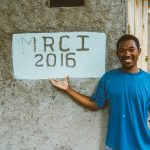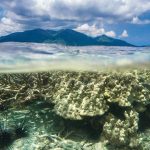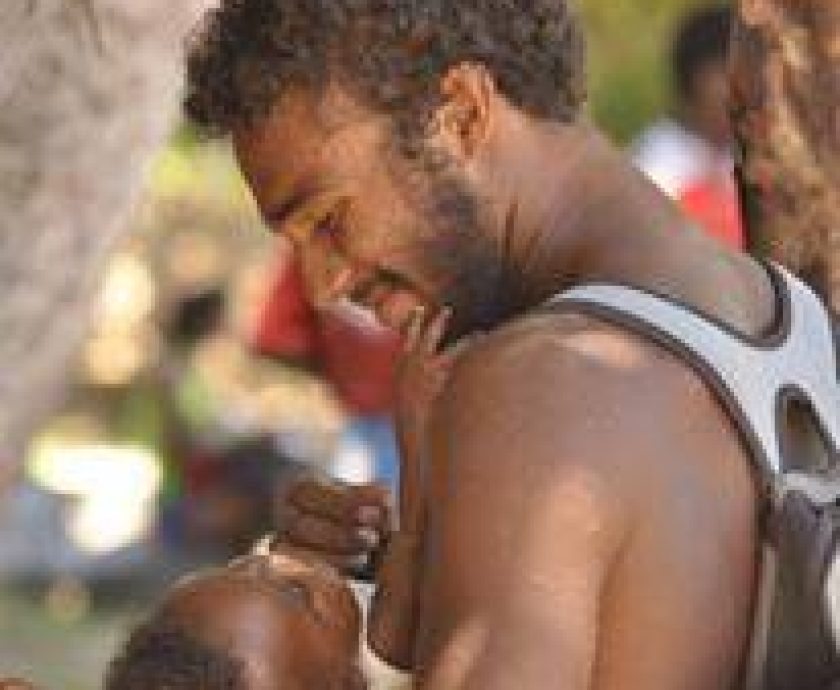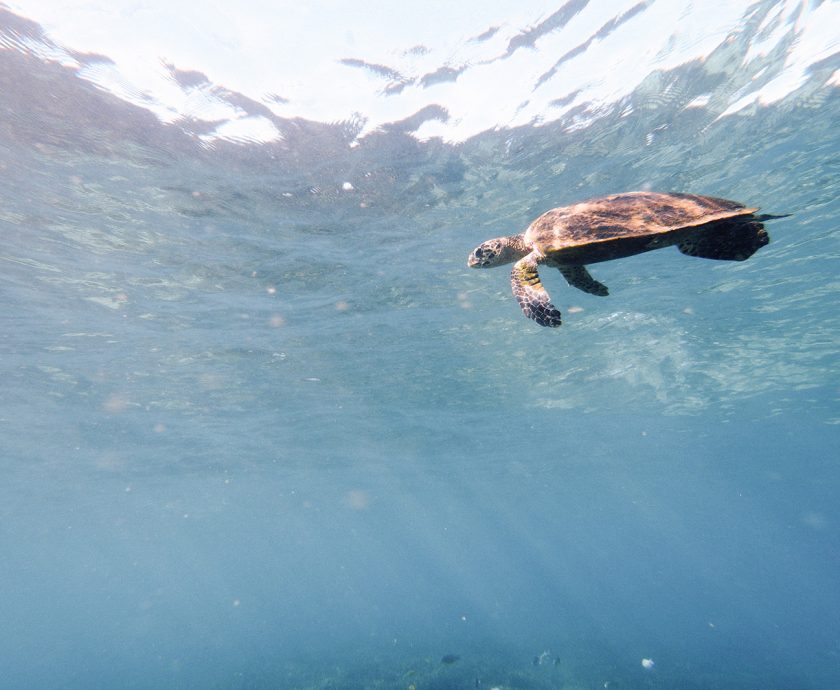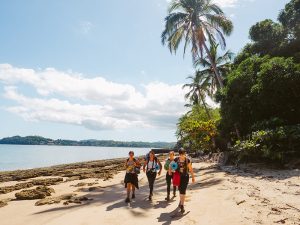 As part of our Forest Conservation volunteer program, volunteers regularly hike through our neighbouring forests and reserves. Recently, a group enjoyed an overnight stay in the Lokobe Forest Reserve. Natalia shares the experience with us:
As part of our Forest Conservation volunteer program, volunteers regularly hike through our neighbouring forests and reserves. Recently, a group enjoyed an overnight stay in the Lokobe Forest Reserve. Natalia shares the experience with us:
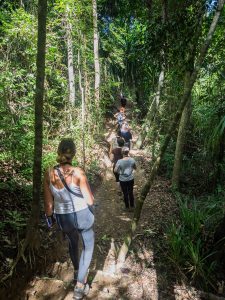 The boat arrived at our base camp at 6 am in the morning to take us to Nosy Be port. After purchasing a few snacks at local stalls on the streets of Hell-Ville, we caught the local tuk-tuk, to take us to the gates of the Lokobe Forest Reserve.
The boat arrived at our base camp at 6 am in the morning to take us to Nosy Be port. After purchasing a few snacks at local stalls on the streets of Hell-Ville, we caught the local tuk-tuk, to take us to the gates of the Lokobe Forest Reserve.
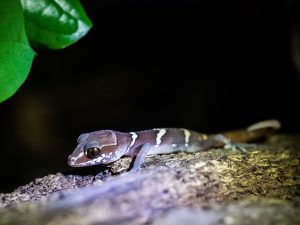 Located in the south-eastern part of Nosy Be, this ancient forest gained protected area status in 1927 while the reserve itself was only created in 1966.
Located in the south-eastern part of Nosy Be, this ancient forest gained protected area status in 1927 while the reserve itself was only created in 1966.
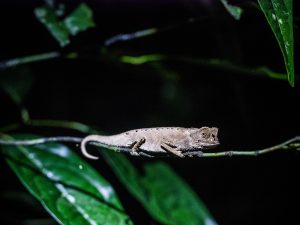 With a great diversity of fauna and flora, this park is a must-visit while in Nosy Be. The park is mostly known for its endangered black lemurs and of which, sadly, there are only a few left to see.
With a great diversity of fauna and flora, this park is a must-visit while in Nosy Be. The park is mostly known for its endangered black lemurs and of which, sadly, there are only a few left to see.
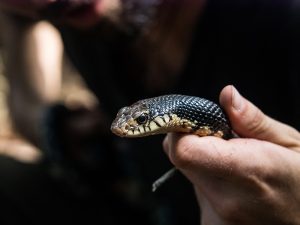 After entering the gates, we went to pick up our tents from the office, where we also met our guide for the day. One can visit Lokobe during the day and walk through the forest without a guide but for overnight trips a guide is necessary. He guided us through the forest, pointing out and talking about native palms and trees, spotting chameleons and geckos. Perhaps, the most exciting part of our afternoon walk was crossing paths with a Hognose snake and a Ground Boa.
After entering the gates, we went to pick up our tents from the office, where we also met our guide for the day. One can visit Lokobe during the day and walk through the forest without a guide but for overnight trips a guide is necessary. He guided us through the forest, pointing out and talking about native palms and trees, spotting chameleons and geckos. Perhaps, the most exciting part of our afternoon walk was crossing paths with a Hognose snake and a Ground Boa.
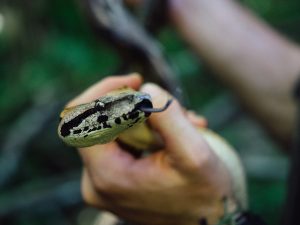 Even though Madagascar has no venomous snakes, the Hognose has been classified as a venomous. Their saliva is toxic to small prey such as frogs and toads and therefore meets the definition of venom although it is unlikely to cause serious injury to humans. They can be a bit aggressive though and therefore only Gui (our terrestrial science manager) who knows how to handle these snakes, is allowed to pick one up.
Even though Madagascar has no venomous snakes, the Hognose has been classified as a venomous. Their saliva is toxic to small prey such as frogs and toads and therefore meets the definition of venom although it is unlikely to cause serious injury to humans. They can be a bit aggressive though and therefore only Gui (our terrestrial science manager) who knows how to handle these snakes, is allowed to pick one up.
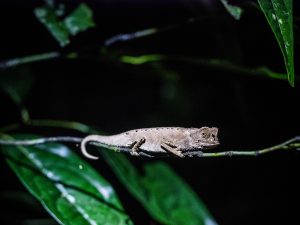 The hike to the campsite in Lokobe was about 3km long, taking us around the coast, through the forest and some open areas with great views of Nosy Be and Nosy Komba. After arriving at camp, we helped each other setting up tents and headed out for a swim while our staff members prepared dinner with fresh salad and fruit on side.
The hike to the campsite in Lokobe was about 3km long, taking us around the coast, through the forest and some open areas with great views of Nosy Be and Nosy Komba. After arriving at camp, we helped each other setting up tents and headed out for a swim while our staff members prepared dinner with fresh salad and fruit on side.
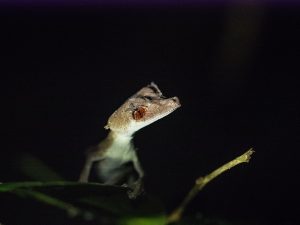 After dinner, we grabbed our head torches, put our boots back on and went for a night walk, hoping to spot some of the elusive black lemurs. We spent an hour walking around the forest spotting all sorts of different nocturnal lizards, geckos and were even lucky enough to see a few pairs sparkling lemur eyes high up in the trees.
After dinner, we grabbed our head torches, put our boots back on and went for a night walk, hoping to spot some of the elusive black lemurs. We spent an hour walking around the forest spotting all sorts of different nocturnal lizards, geckos and were even lucky enough to see a few pairs sparkling lemur eyes high up in the trees.
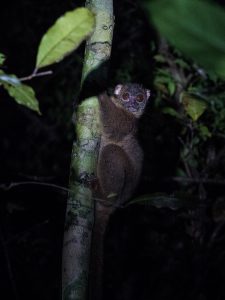 The next morning, we woke up quite early, cleaned up, had a small breakfast and headed back to the entrance. On our way out, we were able to spot few more species of lizards and numerous birds.
The next morning, we woke up quite early, cleaned up, had a small breakfast and headed back to the entrance. On our way out, we were able to spot few more species of lizards and numerous birds.
Arriving back at our base camp the same day, the other volunteers were waiting for us and welcomed us back with many questions about our trip. We were happy to share our stories and photos with them and we hope you enjoy them too.



